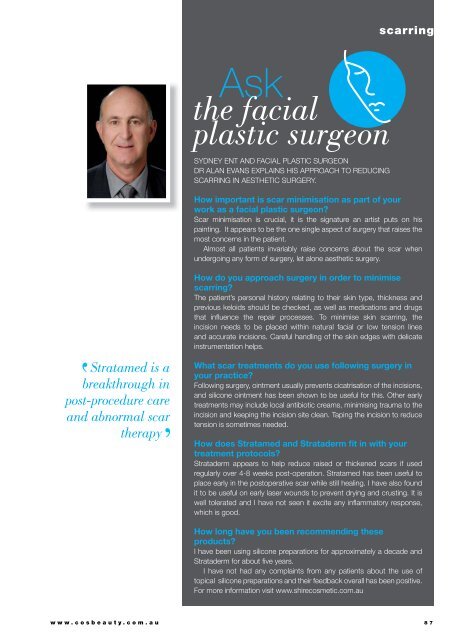Cosmetic Surgery and Beauty Magazine #68
Create successful ePaper yourself
Turn your PDF publications into a flip-book with our unique Google optimized e-Paper software.
scarring<br />
Ask<br />
the facial<br />
plastic surgeon<br />
SYDNEY ENT AND FACIAL PLASTIC SURGEON<br />
DR ALAN EVANS EXPLAINS HIS APPROACH TO REDUCING<br />
SCARRING IN AESTHETIC SURGERY.<br />
How important is scar minimisation as part of your<br />
work as a facial plastic surgeon?<br />
Scar minimisation is crucial, it is the signature an artist puts on his<br />
painting. It appears to be the one single aspect of surgery that raises the<br />
most concerns in the patient.<br />
Almost all patients invariably raise concerns about the scar when<br />
undergoing any form of surgery, let alone aesthetic surgery.<br />
Stratamed is a<br />
breakthrough in<br />
post-procedure care<br />
<strong>and</strong> abnormal scar<br />
therapy<br />
How do you approach surgery in order to minimise<br />
scarring?<br />
The patient’s personal history relating to their skin type, thickness <strong>and</strong><br />
previous keloids should be checked, as well as medications <strong>and</strong> drugs<br />
that infl uence the repair processes. To minimise skin scarring, the<br />
incision needs to be placed within natural facial or low tension lines<br />
<strong>and</strong> accurate incisions. Careful h<strong>and</strong>ling of the skin edges with delicate<br />
instrumentation helps.<br />
What scar treatments do you use following surgery in<br />
your practice?<br />
Following surgery, ointment usually prevents cicatrisation of the incisions,<br />
<strong>and</strong> silicone ointment has been shown to be useful for this. Other early<br />
treatments may include local antibiotic creams, minimising trauma to the<br />
incision <strong>and</strong> keeping the incision site clean. Taping the incision to reduce<br />
tension is sometimes needed.<br />
How does Stratamed <strong>and</strong> Strataderm fit in with your<br />
treatment protocols?<br />
Strataderm appears to help reduce raised or thickened scars if used<br />
regularly over 4-8 weeks post-operation. Stratamed has been useful to<br />
place early in the postoperative scar while still healing. I have also found<br />
it to be useful on early laser wounds to prevent drying <strong>and</strong> crusting. It is<br />
well tolerated <strong>and</strong> I have not seen it excite any infl ammatory response,<br />
which is good.<br />
How long have you been recommending these<br />
products?<br />
I have been using silicone preparations for approximately a decade <strong>and</strong><br />
Strataderm for about fi ve years.<br />
I have not had any complaints from any patients about the use of<br />
topical silicone preparations <strong>and</strong> their feedback overall has been positive.<br />
For more information visit www.shirecosmetic.com.au<br />
www.cosbeauty.com.au 87


















